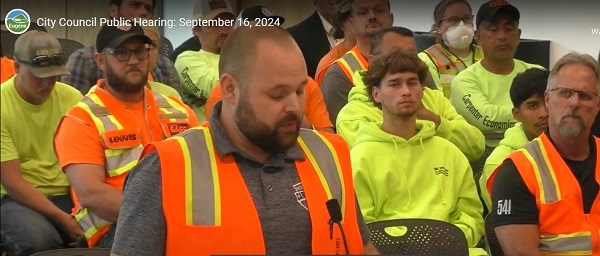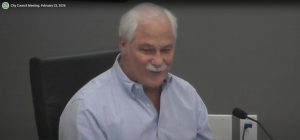Eugene asked to send a message on worker rights
8 min read
Should the city give housing developers a tax break within a small downtown area? The carpenters union said no, not given the current state of the construction industry—not until our rights are protected. During a public hearing Sept. 16:
Chris McGhee: My name is Chris McGhee. I’m a special representative for the Western States Regional Council of Carpenters. I just want to be clear that this is not a union or non-union issue. It’s a human rights issue. These workers are being taken advantage of.
[00:00:30] When you are working for a third- or fourth-tier subcontractor, you are more than likely working for a labor broker. We have found that these workers building these projects are making around a 40% AMI. Also, what do you need to rent or lease an apartment? Proof of income. When you are paid cash, how do you do that? You can’t.
[00:00:53] Let’s say you have a 50-unit apartment complex that takes 200 workers to build. You can now house 50 of these workers that just built the complex. In return, you just created a need for 150 more units, essentially by allowing these developers and contractors to undermine the area standard, you are now creating a greater need for affordable housing as it is being built.
[00:01:20] By implementing these labor standards into programs like MUPTE (Multi-Unit Property Tax Exemption) or the accelerated MUPTE, we are ensuring that these workers are treated and paid correctly. Do we want developers and contractors to make a profit? Yes, we do. But not illegally off the worker’s back. We need to send a message to developers: If you’re going to build in Eugene, you need to do it responsibly.
[00:01:46] We have all heard developers say that this project will not pencil out if they do not receive the community benefit. It will pencil out and with a profit. Let’s add community wealth into the equation by attaching policies into these projects. Thank you for your time and listening.
[00:02:08] Garth Finley: I’m Garth Finley, special rep with the Western States Regional Council of Carpenters. Let’s take a look at the true cost of low wages when labor standards are not attached to these policies. Low wages and exploitive practices in the construction industry both in Oregon and nationally cause profound hardships for workers and their families.
[00:02:29] It also costs the public when employers misclassify the workers and pay them under the table. They are defunding and defrauding government programs including workers compensation, Social Security, and Medicare. When people are not being paid area-standard wages, these issues are created.
[00:02:54] Who picks up the bill? When people are robbed, communities are robbed with them. When you’re cutting corners, taking shortcuts, saving a dollar, you end up spending more in the long run and passing the true cost on to your constituents. When your local workforce is subjected to state law violations, unfair labor practices, human rights violations, and ultimately tax fraud is what we’re talking about.
[00:03:20] These acts burden these public services, defund your first responders, schools, and roads, to list a few. Look at the few many examples that you drove by on your way here tonight. The proof is in the city streets. It’s right out underneath that bridge out there. There’s a lot of abuse just going outside on outside these doors.
By adding these labor standards to the accelerated MUPTE program and other existing programs, you’re sending a powerful message to the community that as leaders of this city, you’re looking after the better interests of the workers and community members and not catering to the developer interests of continued generational wealth but creating that community wealth and investing back into the wonderful people that live and work right here in Eugene.
[00:04:11] Eric Morgan: For the record, my name is Eric Morgan. I’m a special representative for the Western States Carpenters Union, and I live in Ward 2. I’m here to speak against the accelerated MUPTE program because of the lack of labor standards. As you all know, Eugene is deep into a housing crisis and I want to commend the staff and council for exploring ideas and incentives to bring more housing to our city.
[00:04:31] That being said, I truly believe that we are missing the mark. As a carpenter representative, we are on job sites every day talking to workers. Cash payment, tax fraud, and wage theft is running rampant in the construction market in Eugene and we have the videos to prove it. Developers are utilizing contractors that undermine the area’s standard wages to maximize profit while getting tax cuts on top of it.
[00:04:55] These contractors use labor brokers. Labor brokers provide the labor force for contractors that are often third- or fourth-tier subs on carpenter scopes of work. The workers that are building these apartments are trapped in a cycle of indentured servitude and in many cases they’re getting paid $80 to $100 a day for 10-hour, 10-to-11-hour days.
[00:05:19] These practices allow unscrupulous contractors to undercut those who play by the rules. They sidestep taxes and worker protections and hollow out our local economy in the process. This creates an unfair playing field where responsible contractors struggle to compete.
[00:05:35] This is a direct attack on workers’ dignity. Whether it’s misclassifying workers, underpaying, refusing overtime, or outright stealing hours, it robs families of the money they’ve rightfully earned.
[00:05:47] For too long, dishonest contractors have exploited loopholes, taken advantage of workers, often the most vulnerable among us, who are just trying to provide for their family.
[00:05:57] If developers are going to receive a benefit from programs like MUPTE, where there will be able to make generational wealth out of a single project, we believe that they need to make a one-time investment into our community. This includes offering an area-standard wage, full family health care, utilization of state accredited apprenticeship programs, and prioritizing local workforce.
[00:06:19] We urge that you protect workers and their families by enforcing these standards. Our union is committed to advocating for fair wages, benefits, and worker protections. Let’s stand together for fairness, justice, and integrity for our community. Thank you.
[00:06:35] Greg Bryant: I want to speak to values. I think we don’t know—we’re not being explicit about the kinds of things that we want in our city. I don’t think we want the kinds of housing skyscrapers that are being built today along Franklin Boulevard, for example. And we don’t want the kind of temporary junk that MUPTE built along Willamette Street.
[00:06:53] They don’t reflect any human values, really. Labor standards are extremely important, public benefits are extremely important, public values, community values, incredibly important. I’ll speak to a few. But major developers and for-profit developers, out-of-town-finance developers, as the student housing on Franklin demonstrate, don’t care about these values.
[00:07:14] Solutions are difficult to find, but perhaps the city could partner directly with local nonprofits and new small local developers to build reasonably priced housing that meets all these standards and values.
[00:07:25] Here’s some more of those community values:
[00:07:27] First, developers should do no harm. They shouldn’t tear down trees or natural spaces or even spaces that could become regenerated natural space. They shouldn’t tear down affordable housing or the very important affordable commercial buildings that we need for small businesses to start up.
[00:07:42] So what does that leave us? They should build on empty lots, preferably surface parking, which we have far too much of downtown. The fact that existing parking spots are used tells us nothing since people drive and park more when it’s made easy to do so (see Jevon’s paradox or induced demand in economics).
[00:07:59] They shouldn’t build buildings that are taller than four to six stories high. There are plenty of studies that show that this is hard on cities, and they’re expensive. They raise rents. They have other negative offensive effects that you can see if you walk through the maze of buildings on skyscrapers on Franklin Boulevard.
[00:08:15] They shouldn’t use concrete when they don’t need to. This increases the heat island effect, which increases Eugene’s carbon footprint.
[00:08:21] They should respect the building site. Preserve old trees, because they absorb far more carbon than young trees. And give them room to live properly. Preserving site trees also gives a good shape to otherwise harshly shaped or arbitrarily shaped buildings.
[00:08:34] Basically, I’m asking for people to build smaller, work on solving this problem in very tangible increments that we don’t have to involve yearlong, big developments. Thank you.
[00:08:47] John Q: Eleven others favored the downtown core housing initiative, and some warned about provisions that would turn away developers. Some also sought to expand the tax break to a larger area.
[00:09:00] Councilor Mike Clark: The gentlemen who spoke about labor standards mentioned several types of potential issues around labor standards. And when (former City Councilor) George Brown and I first got together and started talking about revising the benefit criteria for MUPTE, the full version, one of the things that I was most interested in doing was making sure that we had the public benefit of hiring local when it came to the people who were doing the actual work to build the things that we were incentivizing, and was told that there was state law that severely limited our ability to do that. I’m interested in knowing which of the mentioned labor standards are legal for us to consider in this process, and which are in some way constrained by state law.
[00:09:54] John Q: Staff will follow up. The council may also follow up with developers given tax breaks.
[00:10:01] Councilor Mike Clark: My idea was that we certify payroll so that we can see the zip codes of everybody who is getting paid to work on the thing. So we knew local people were hired or not. At the time, that was a consideration in order to comply with the state law.
[00:10:17] But if what these gentlemen are saying is true, and we’re treating people inappropriately and there’s a public benefit involved and a tax abatement involved I would be willing to at least have a conversation about the clawbacks issue for those that have put in writing how they’re going to behave and then not doing it. There should be a consequence in my opinion. So…I’d be willing to have that part of the conversation again.
[00:10:45] John Q: The city is asked to send a message to developers: If you’re going to build in Eugene, you need to do it responsibly.




